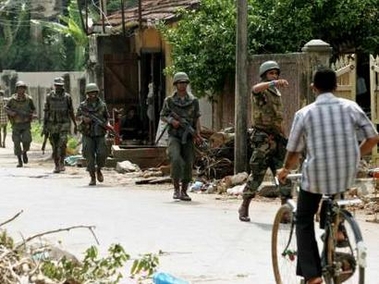|
Foreign ambassadors to meet with rebel leaders in Sri Lanka
(AP)
Updated: 2005-12-24 14:00
Envoys from Asia and Europe headed for Tamil rebel territory Saturday to meet
with guerrilla leaders in an effort to quell growing violence that threatens to
shatter the country's cease-fire, officials said.
In the latest fighting, 13 members of Sri Lanka's navy traveling in a bus
were killed in an ambush on Friday. The government blamed the rebels for the
attack.
The envoys _ from Japan, Britain, Norway and European Union _ represent key
backers of Sri Lanka's peace process and they planned to meet with rebels'
political leader, S. P. Thamilselvan in the northern guerrilla stronghold of
Kilinochchi, the pro-rebel Web site, TamilNet said.

Sri Lankan government soldiers patrol a street
in Jaffna, northern Sri Lanka, December 20,
2005.[Reuters] | In Friday's attack, assailants fired rocket-propelled grenades and triggered
a land mine in an ambush on about 30 sailors traveling by road toward their base
in Mannar district, 220 kilometers (135 miles) north of the capital, Colombo,
said navy spokesman Cmdr. Jayantha Perera. Two sailors were wounded, he said.
Sri Lanka's Prime Minister Ratnasiri Wickremanayake and Foreign Minister
Mangala Samaraweera met with ambassadors from the three nations and the EU after
the attack and urged them to take steps to ensure the rebels "desist from
further escalating the violence in the north and east," a government statement
said.
But the rebels have denied involvement in the attack.
"The ... Tigers were not involved in any activity that breaches the
cease-fire agreement," rebel spokesman Daya Master told The Associated Press by
telephone from Kilinochchi. "There is no connection whatsoever between us and
this attack."
Hagrup Haukland, a Norwegian who heads the 60-member European team monitoring
the Sri Lankan truce, said the latest violence has endangered the peace deal.
"The cease-fire agreement is in jeopardy, absolutely," Haukland told
reporters.
"The situation is alarming," said Haukland, adding that he and some other
monitors were canceling their Christmas leave. "There is a lot of concern what
will happen," he said, suggesting that the two sides meet.
Violence has escalated in Sri Lanka's ethnic Tamil-majority northeast since
rebel leader Velupillai Prabhakaran threatened to resume his struggle for an
independent Tamil homeland if the government fails to address Tamils'
grievances.
This month alone, at least 33 government security personnel, including the
sailors, were killed and many more injured in attacks blamed on the rebels.
The Tamil Tigers started fighting in 1983 for a separate Tamil homeland in
the island nation's north and east, claiming discrimination by the majority
Sinhalese. The conflict killed about 65,000 people.
|